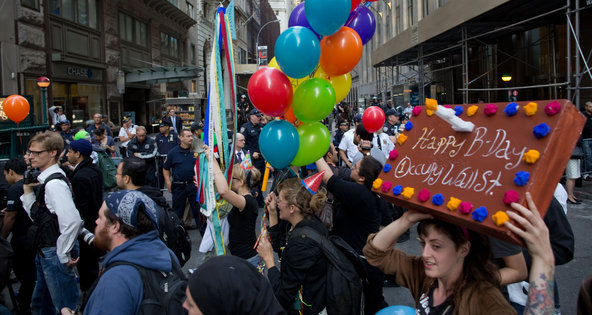 Marcus Yam for The New York TimesOccupy Wall Street protesters gathered on Monday near Zuccotti Park in Lower Manhattan.
Marcus Yam for The New York TimesOccupy Wall Street protesters gathered on Monday near Zuccotti Park in Lower Manhattan.
It will be an asterisk in the history books, if it gets a mention at all.
A year ago this week, the Occupy Wall Street movement got under way in Zuccotti Park in Lower Manhattan. The loose group of protesters, frustrated by the economic downturn, sought to blame Wall Street and corporate America for many of the nation’s ills.
While the movement’s first days did not receive much news coverage, it soon turned into a media frenzy, with some columnists comparing its importance to that of the Arab Spring, which led to the overthrow of leaders in several Middle Eastern and African countries, spurred by social media. Images of the Wall Street protesters getting arrested were looped on news channels and featured on the covers of newspapers. Big banks — and the famous Charging Bull statue that is an icon of Wall Street — were fortified with barricades. By the end of the year, Time magazine had named the protester its Person of the Year, perhaps rightly given the revolutions taking place around the world, but the magazine also lumped Occupy Wall Street in among the many meaningful movements taking place.
DealBook Column
View all posts
Related Links
But now, 12 months later, it can and should be said that Occupy Wall Street was — perhaps this is going to sound indelicate — a fad.
That is not to say that Occupy Wall Street had no impact. It created an important national conversation about economic inequality and upward mobility. The chant, “We are the 99 percent,” has become part of the lexicon. Its message has subtly been woven throughout the Obama administration’s re-election campaign, in the Democrats’ position on everything from taxes on the highest earners to the soaring levels of student debt.
But consider this: Has the debate over breaking up the banks that were too big to fail, save for a change of heart by the former chairman of Citigroup, Sanford I. Weill, really changed or picked up steam as a result of Occupy Wall Street? No. Have any new regulations for banks or businesses been enacted as a result of Occupy Wall Street? No. Has there been any new meaningful push to put Wall Street executives behind bars as a result of Occupy Wall Street? No.
And even on the issues of economic inequality and upward mobility — perhaps Occupy Wall Street’s strongest themes — has the movement changed the debate over executive compensation or education reform? It is not even a close call.
Is there still anger and angst over the horrible unemployment problem in the United States? Absolutely. But that sentiment, and whatever conversation has emerged as result, was going to happen with or without Occupy Wall Street.
The Wall Street banks themselves hardly felt the pinch of the protesters, beyond considering them a nuisance and an additional security cost. Despite campaigns for customers to move money to smaller, community banks, few customers did.
The biggest victory, perhaps, that the movement can claim was a decision by Bank of America and other big banks to scrap plans to charge additional fees for use of debit cards. The protesters also brought awareness to banks’ foreclosure practices, and even successfully petitioned to keep some struggling borrowers in their homes.
In the fall of 2011, questioning anything about the movement was not too popular. Doing so was an invitation for withering ridicule. (I experienced it firsthand after I filed what I thought was a relatively respectful column about the protests from Zuccotti Park.)
The problem with the movement, as many other columnists have pointed out before, was that its mission was always intentionally vague. It was deliberately leaderless. It never sought to become a political party or even a label like the Tea Party.
By the second or third time I went down to Zuccotti Park, it became clear to me that Occupy Wall Street, which began with a small band of passionate intellectuals, had been hijacked by misfits and vagabonds looking for food and shelter.
Given the way the organization — if it can be called that — was purposely open to taking all comers, the assembly lost its sense of purpose as various intramural squabbles emerged about the group’s end game.
I vividly remember watching one protester with a sign that read “Google = Jewish Billionaires.” Another protester ran over and ripped up the poster. The messages had become decidedly too mixed.
Eliot L. Spitzer, the former New York governor and former attorney general who has been a longtime supporter of Occupy Wall Street, recently reflected on the legacy of the movement.
“They are redefining and rebalancing our political discourse,” he wrote in Slate. “To all those who are dissatisfied because the Occupy movement did not grow into the complete political theory or social agenda that some wished, I say: Give credit where credit is due.”
Fair enough. But even Mr. Spitzer questioned, “We do have to ask, ‘Now what?’ ”
A version of this article appeared in print on 09/18/2012, on page B1 of the NewYork edition with the headline: Occupy Wall Street: A Frenzy That Fizzled.
Article source: http://dealbook.nytimes.com/2012/09/17/occupy-wall-street-a-frenzy-that-fizzled/?partner=rss&emc=rss
